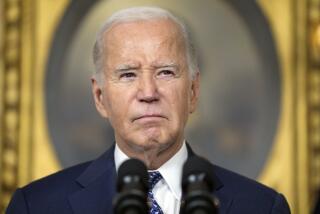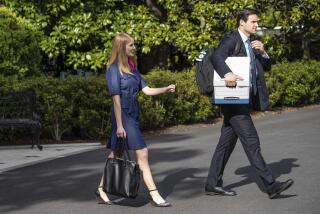Deaver’s Contract With Canada May Violate Law, GAO Reports : Information Sent to Justice Dept. for More Study
- Share via
WASHINGTON — Lobbyist Michael K. Deaver may have violated federal conflict-of-interest laws because he handled U.S.-Canadian issues as a top White House official and then signed a private contract with Canada, the General Accounting Office said today.
“Because the information we developed . . . indicates a possible violation of the post-employment laws and a need for further investigation, we have referred our findings and relevant documents to the Department of Justice,” said James F. Hinchman, the GAO’s deputy general counsel.
Hinchman presented the congressional watchdog agency’s findings to the House Energy and Commerce subcommittee on oversight and investigation, chaired by Rep. John D. Dingell (D-Mich.).
Dingell said “many judgments have been made concerning the legality and the propriety of these (Deaver’s) activities” but added that he will say no more on the propriety of Deaver’s dealings until the panel’s inquiry is finished.
At the White House, spokesman Larry Speakes refused to comment on the Deaver investigation.
Deaver Still Has Pass
Speakes also said he does not know whether Deaver has spoken with President Reagan since the question of conflict-of-interest violations arose. The spokesman acknowledged, however, that Deaver continues to receive the detailed, unpublished schedule of the President’s activities and retains his White House pass enabling him to enter the White House compound.
In a 20-page prepared statement, Hinchman detailed Deaver’s involvement in negotiating the differences between Canada and the United States over acid rain.
The report said it appears that Deaver, who was the White House deputy chief of staff, “participated in an Administration decision to invoke the special envoy process by which the United States and Canada have attempted to resolve their differences over acid rain.”
After leaving the White House on May 10, 1985, two months after Reagan named former Transportation Secretary Drew Lewis as the special envoy, Deaver represented the Canadian government in a meeting with Lewis “at which differences between the United States and Canada over the contents and issuance of the special envoy’s report were discussed,” Hinchman said.
Conflict-of-Interest Laws
The GAO said Deaver’s representation of Canada calls into question conflict-of-interest laws that bar former federal employees from representing anyone before the government on particular matters in which the ex-employees were “personally and substantially” involved.
Also, the GAO said there is a question as to whether Deaver’s meeting with Lewis on Oct. 25, 1985, was a violation of the law prohibiting people from lobbying before their old agencies. Lewis was a representative of the President, and as such might be considered “an officer of the White House office,” Hinchman said.
Hinchman stressed that the GAO’s report, which was requested by Dingell on Dec. 10, 1985, was a preliminary investigation.
More to Read
Sign up for Essential California
The most important California stories and recommendations in your inbox every morning.
You may occasionally receive promotional content from the Los Angeles Times.













